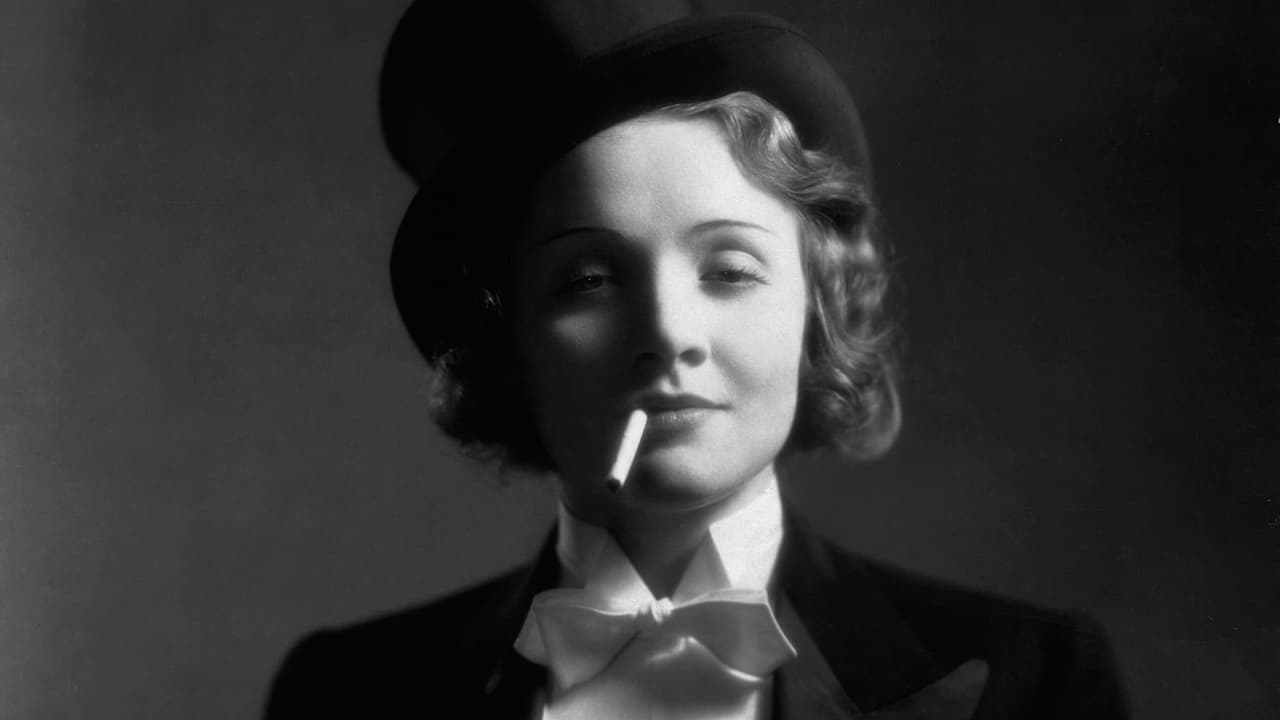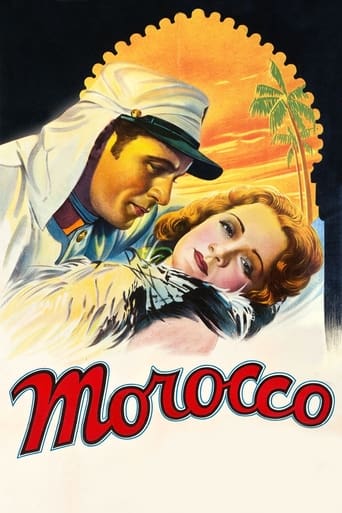

Morocco was Marlene Dietrich's American film debut and it was directed by Josef von Sternberg.Made before the time of the Hays Code. Dietrich's appearance in a cabaret wearing a suit and a top hat was an alluring image, so was her kiss to another woman. The film also has slight nudity of a desert woman.Dietrich was Oscar nominated as a sultry sexy cabaret performer who is desired by two men. Gary Cooper has joined the French foreign legion, running away from something he puts his life in danger fighting in the Moroccan desert.Adolphe Menjou is a suave wealthy suitor who truly loves Dietrich even if he believes underneath that he might lose her to Cooper.The film made in 1930 is rather creaky, slow moving and does not contain much of a story.
... View MoreCall me a philistine but, I really don't care about the early movies that primary focus on a star, whether it's Marlene Dietrich, Greta Garbo or Asta Nielsen. Everybody is raving about their 'marvelous' performances, but a performance alone doesn't make a great movie, especially if the characters are flat and the plot barely existing. The director can spend as much time as he wants to light an actresses face as beautiful as possible,but this time would be better spent on character development or something that makes the movie worth watching.I'm not saying Josef von Sternberg is a bad director, ''Der blaue Engel'', his first collaboration with Dietrich, was a great movie. The difference between this movie and ''Morocco'' is that it has an interesting plot and Emil Jannings character actually has an arc which develops beautifully and is foreshadowed in early scenes.But ''Morocco'' isn't without any merits. The kissing-scene must have been shocking for audiences back then and even if you watch this scene today you definitely won't expect this from a movie from this time. Props to Dietrich to be this daring. Another great moment was the scene when Dietrich rushes to visit Gary Cooper in the hospital and the pearl necklace rips, which is a great moment of character building that, unfortunately, is rare in this film.The scene that will stuck most with me and probably with most people who have seen this film is the ending. The buildup when Dietrich stands at the gate and the soldiers are marching into the desert looks fantastic, which is followed by an even better shot of Dietrich walking behind the last dune and the entire frame is filled with the desert and the sound of a storm approaching.Considering the good scenes, it is a shame that the rest of the film is mediocre at best and could not be saved by the fantastic ending.
... View Morenot for distance of time but for the mixture of high performance, exotic atmosphere and correct love story. it could seems be silly today, to pink or childish but the technique aspects, the construction of characters, the ambiguous aspects of Dietrich role and the precise references to classic stories are the good point.a seductive film for its special flavor and for the role of part of a image about Africa, different by Casablanca but important for the sensitivity of a period, mixture of romanticism, ambiguity and heroism, sacrifice and great love. a film for each time. not only for its documentary value, but for the quality of source of nostalgia.
... View MoreWhy should we watch now this eighty years old film, made in black and white, slow moving forward, with only latent developing story? I'll try to answer this question. The thrill of "Morocco" lies in the characters of the protagonists, played by unforgettable Marlene Dietrich and Gary Cooper. I believe, Voltaire said once that the most beautiful thing in the world is a human face, and it seems to be true, when you watch their faces.The sparkles between a legionnaire Tom Brown (Cooper) and a singer Amy Jolly (Dietrich) are immense, it's love from the first sight, we see this on his face and we see it in her handling him the key from her flat, just in the first evening.While the rich gentleman Le Bessiere (Adolphe Menjou) is at the beginning just curious about her and her further fate, and only later gets really involved with her, the young legionnaire seems to be blown off by her first appearance on stage. Amy Jolly has certainly no "stage fright", she knows very well how to play audience, and doesn't need any advice from the owner of the place. She attracts attention by wearing her extravagant costume and then by taking a flower from a woman's hair and kissing her (rather teaching her manners than anything else). And then suddenly this flower will be given away: to Tom Brown. So we see the very beginning of the romance, and we see the reactions of the audience.The thrill is in the nuances, in the play of shadows and light. Perhaps, the pauses in the dialogs are as meaningful as the words: when Tom Brown says: "Nothing... yet!", we know already what kind of fellow he is, or even more famous example: Amy Jolly says after a long pause: "I'll be back... wait for me." It's more impressive than those dozen words she could fill in this empty time space. But the intensity of the scene would be lost! I must also stress the brilliance of the love dialogs in "Morocco". For instance it's a wonderful line, when Amy Jolly says to Tom Brown: "You should go now... I'm beginning to like you." It's a deeper insight into a woman's soul.About the rich man: somehow he seems rather playing games with Amy Jolly, so he provokes her by saying about the women following the legion into the desert that they love their men. I guess the meaning of his words was that she, Amy, does not love anyone really, and then she belongs to him, into his world. If she does, she should make her choice.Cooper gives a genius imitation of the way Tom Brown speaks: he speaks like a soldier, in a hacked, simple, straight forward manner.At the end of the film Amy Jolly takes off her shoes to follow her man; maybe this scene has influenced the other film makers ("The red shoes" (1948) and "The river of no return" (1954)).What is also interesting about "Morocco" is a multilingual surrounding: we hear English, French, German, Arabic and Spanish.In my opinion it's the best not only of Dietrich, but also of the young Cooper, because only after seeing "Morocco" I start to believe in him as a charming Casanova from Hollywood.
... View More